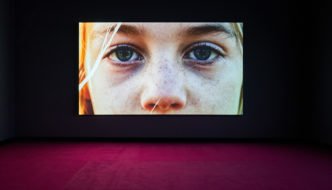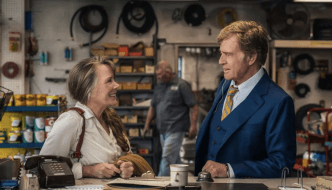Review: Sunday @ Sheffield’s DocFest
June 20, 2016

Ambulance
In Pursuit of Silence is a lyrical treatise on the role of silence in human development, and its increasing absence in modern society. In its attempt to contextualise silence historically, spiritually, psychologically and socially, Patrick Shen’s film blends contributions from doctors, educators, theologians and philosophers with some stunning landscape photography which calls to mind slow cinema masters like Béla Tarr and Lisandro Alonso in its gentle elegance and meditative pacing. Through its invocation of silence and solitude as a means of revelation and personal discovery, our senses become attuned to the rhythms of nature the film seeks to emulate; simple, immutable beauty which speaks ‘the language of the great silent places’. In Pursuit of Silence strives to remind us that ‘silence is a sound’ with its skilful sound design; though the addition of background music in certain scenes undermines its thesis to a degree. In Pursuit of Silence is the point at which conceptual art and film intersect; it is cinema as a form of communion, in which ‘we hear something deeper than our chatter’ and ‘speak something deeper than out words’; a poetic plea to step towards the world. The spiritual and physiological repercussions of not doing so could be dire.
Equally elegiac is Brothers, which tells the story of two brothers in their nineties returning to the Polish village from which they were exiled eighty years ago. The brothers’ story is told with great economy and empathy by writer/director Wojciech Staron, who eschews biographical detail and allows the dynamic of the brothers’ relationship to be revealed in their often terse interactions: we see one brother’s artistic passion and another’s acquiescence. The ghosts of the brothers’ past in a Soviet work camp are alluded to in a series of home movies, which bridge the extended scenes and lend Brothers an episodic quality. Brothers plays like Grey Gardens (1975) by way of Rams (2015), full of gentle humour with an undercurrent of sadness and the bleak majesty of fog-swathed, windswept landscapes, captured beautifully by Staron. Brothers is a disarming piece which balances artistry and heart in its celebration of an unbreakable bond and the continuity of the creative spirit through untold hardships.
Sour Grapes tells the incredible story of wine counterfeiter Rudy Kurniawan; but uses its Hitchcockian premise as a Trojan horse to set forth a study of greed run amuck. The wine world is one about which I know or care little; a prejudice solidified by the introduction of ‘the Angry Men’, a group of wealthy wine enthusiasts who think nothing of drinking their way through $20,000’s worth of wine in a single sitting. Into this world enters Rudy; a prodigy possessed of ‘an extraordinary palette’ and seemingly unlimited funds who amasses a formidable cellar of fine wines at California’s elite wine auctions. Rudy’s strategy is faultless: buy up the supply, inflate the value and sell it off. Bill Koch, of the infamous and influential Koch family, acquires the contents of Rudy’s cellar for $35 million, but soon discovers that $4 million of what he has just bought is fake. So begins a tale of intrigue and ego as Koch, the FBI and a disgruntled Burgundy vintner set out to track down Rudy. Directors Reuben Atlas and Jerry Rothwell were blessed with a compelling tale peopled with absolute gifts like Koch, the goofy Koch sibling who demonstrates what Charles and David would be like if they’d set their minds to obsessive collecting instead of subverting democracy. Rudy is a kind of Keyser Söze figure who constructs a persona on the fly and gets by on the force of his charisma, and curiosity builds as the portrait of Rudy is constructed. While Sour Grapes works on the level of something like The Imposter (2012) or The Spanish Prisoner (1997) or Shattered Glass (2003), it is fundamentally a film about money: wine is a symbol for liquidity, an asset bubble that inevitably bursts. The wine bubble is inextricably linked with Wall Street’s ascendancy and functions as a useful metaphor for its excesses. Sour Grapes in a pacey, salacious but sobering portrait of ‘ the Gen X Gatsby’.
Ambulance finds documentarian Mohamed Jabaly thrust into the centre of events. While filming in a Gaza City hospital, the 50-Day War – named Operation Protective Edge – begins. Without informing his family, Jabaly joins an ambulance unit. Through the ambulance’s windscreen we see a beleaguered city; Israeli warplanes and drones a patrol the skies, and missiles target homes they believe conceal Hamas’s network of secret tunnels. The thunder of bombardment and the threat of a ground invasion hangs heavy in the air as the crew speeds to the aftermath of each attack. Ambulance serves the valuable function of cutting through the rhetoric to show the unfiltered reality of life in the Occupied Territories; Ambulance is the essence of vérité. Jabaly steps away from the phalanx of news crews hovering outside the hospital to get closer than anyone to the destruction, and underlines in the starkest terms the value of human life in a conflict zone. Ambulance charts the ambivalence of Jabaly’s role as tribune; sharing his horror and incredulity, his desire to run home, to hide under the covers. Jabaly doesn’t deal in phony heroism; he is not a mere observer whose life is untouched by the conflict. But he also pays moving tribute to the quiet valour of the paramedics, who throw themselves in the face of incessant threats: as the unit’s laconic captain, Abu Marzouq opines, ‘God has made us resilient’. Ambulance is a dizzying, frequently distressing but essential work. The reasons for the war are immaterial; Jabaly is telling a human not a political story, his camera acting as a talisman which finds moments of grace amidst the devastation.
Uncle Howard is a gritty, punk-tinged tribute to filmmaker Howard Brookner, as seen through the eyes of his nephew, Aaron. Howard was always a hero to Aaron, and he retrieves the negatives for Howard’s cult documentary on William Burroughs, Burroughs: The Movie (1983), from Burroughs’ famous bunker. With the help on indie legend Jim Jarmusch – who was sound recordist on Burroughs: The Movie – Aaron constructs a loving but unvarnished picture of his uncle and the times in which he lived. Uncle Howard will be fascinating to anyone, like me, with an abiding interest in this milieu: the pre-gentrification, pre-Disneyfication, pre-AIDS era of New York; a ‘lunar landscape’ whose steady decay sheltered vibrant artistic sects whose unhindered development pushed music, literature and art into dangerous and riveting new territory. But I’m not so sure Uncle Howard will resonate in the same way to anyone unacquainted with the world of New York bohemia; a degree of knowledge on the part of the viewer is assumed. To see footage from the 1978 Nova Convention and Burroughs in unguarded moments between takes – as unguarded as Burroughs ever was – justifies the film’s existence. But Uncle Howard is more than a mere act of hero worship, and what could so easily have been an adjunct to Howard’s footage is sculpted into something of genuine substance in the sections dealing with the arrival of AIDS. Uncle Howard is an exploration of creative paternity – Burroughs played that role for Howard, as did Howard for Aaron – and a lament for the loss of an audacious creative epoch. But equally it is an elevation of the artefacts it left, and the possibility of a renewal.
Follow Daniel Palmer on Twitter at @mrdmpalmer.




Comments